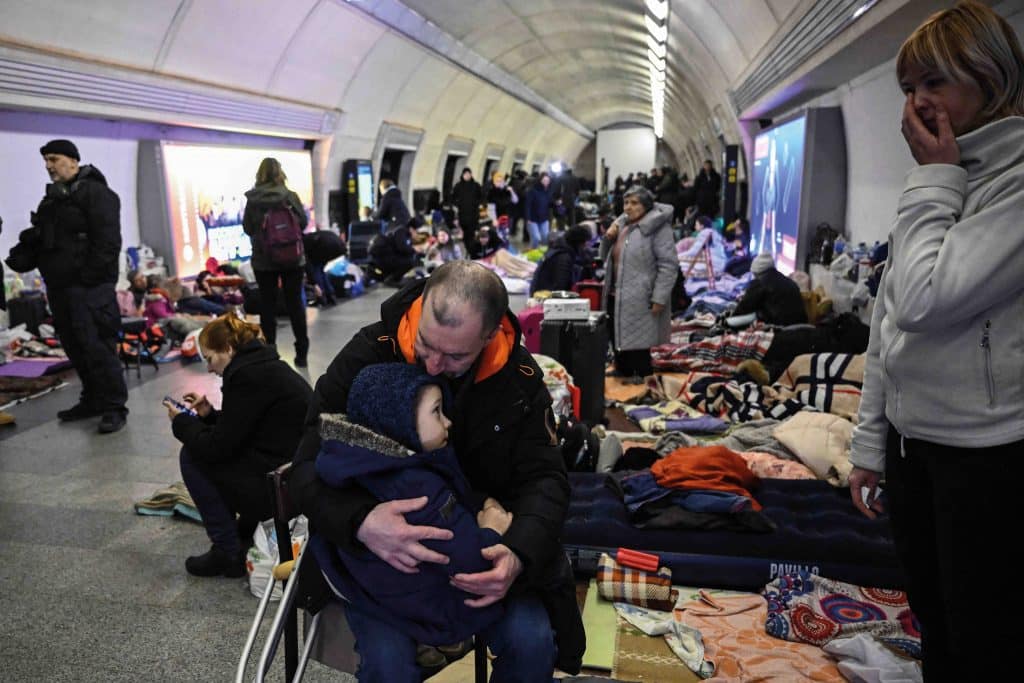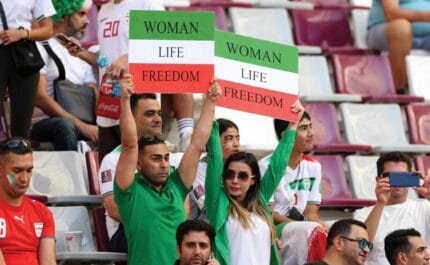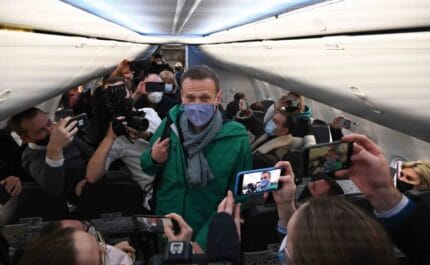The first days of war: The accidental witness
On 24th February Russian tanks rolled into Ukraine, unleashing a new European conflict that would swiftly destroy large swathes of the country and leave thousands dead. Here's the first story from our DG#46 coverage of the first days of the war

Teacher Olena Kurylo after being wounded in a Russian airstrike on a Kharkiv apartment building, 24th February. Photo: Wolfgang Schwan / Anadolu Agency via Getty Images
24th Feb 2022
We spoke to several people in Ukraine and Russia whose lives were thrown into disarray by the outbreak of war. This article is one of several pieces on the first days of the Ukraine conflict we published in issue 46 of Delayed Gratification, which can be purchased at our online shop.
The accidental witness
Just after midnight on 24th February, Julia Vlasenko was asleep on a train heading east out of Ukraine’s capital Kyiv. She was on her way to Kherson to surprise her mother on her birthday.
A little after 5am, Vlasenko was woken by the sound of her phone buzzing repeatedly. Dozens of messages were coming in from her friends and family and her husband was calling. The war had started, he told her, and Kyiv was under attack. Russian troops had been massing on Ukraine’s borders for weeks and Western intelligence had warned that Moscow planned to invade. But Vlasenko hadn’t been too worried. She thought it was just another scare tactic by Russia.
By the time she arrived in Kherson, around two hours later, “the roads were just full of cars trying to leave, people were panicking,” she tells me. She rushed to her mother’s house. In the distance, on the outskirts of Kherson, she could hear echoing booms. “When my mum opened the door, she was in tears.”
A port city with a thriving shipbuilding industry nestled between the Black Sea and the Dnipro River, Kherson was not only a strategically important city for the invading Russian army, it was also an easy target. The city is around 80 miles from the border with Crimea, which was annexed by Russia in 2014, and lies on one of the main routes out of the south-eastern peninsula. Unlike other areas of Ukraine, where civilians were able to flee, Kherson was within easy reach of Russian soldiers and was surrounded within hours of the start of the invasion. “By the time we really understood what was happening there was no safe way out any more,” says Vlasenko. “So, we decided to sit and wait. I went out to buy some food. I bought enough just for a week, maybe a bit more. We thought it would all be over soon.”

Sergiy and Natalia Badylevych sheltering in a Kyiv metro station with their child, 2nd March. Photo: Aris Messinis / STF / AFP via Getty Images
For the next week, mother and daughter didn’t leave the house. When they heard the dull thud of incoming fire, they sheltered in the basement along with a neighbour and her young daughter. Although Vlasenko was frightened by the sounds of fighting outside, she took comfort in knowing it meant the Ukrainians were fighting back. When the guns fell silent she knew it would mean that the city had fallen. Unlike in Mariupol, a city further east that was the long-time base of the infamous Azov Battalion, in Kherson there were just a handful of territorial defence fighters. Outnumbered and outgunned, they could do little to stop the Russians from advancing. Within six days Ukrainian authorities conceded that Kherson was entirely under the control of Russian forces, the first major city in the country to fall.
After a week Vlasenko ventured out of the house to buy bread. “The old people left their houses first, and they told us it’s quiet, just be calm and you will be fine walking in the streets,” she says. When she went outside, Vlasenko found to her horror that armed Russian soldiers were manning military checkpoints across the city. Others patrolled the streets in armoured personnel carriers. “Cars were not allowed to drive more than 30 kilometres an hour, you had to keep the windows open so they could see who was in the car and you had to show your identity documents at each stop,” she says. Most of the shops were closed and the supermarkets that were open had mainly bare shelves. The only way to buy food was on the black market. Prices had risen tenfold for some items. “People sold vegetables, medicines, bread out of the back of their cars; they charged you whatever they liked,” says Vlasenko. “All the Ukrainian television channels were turned off. You could only watch Russian propaganda. My mother said it reminded her of the Soviet days.”
I think the Russian soldiers really believed this story that they were here to liberate us from Nazis”
For the first few weeks of the occupation, Vlasenko attended the pro-Ukraine rallies being held in the city’s central square at the weekends. The demonstrators sang the national anthem, waved the blue and yellow flag of their country and chanted slogans including “Fascists go home”. At first, she recalls, the Russian soldiers seemed bewildered. “They just stood there,” she tells me. Some of them looked very young. “I think they really believed this story that they were here to liberate us from Nazis and that we would welcome them with flowers, but this was all just a fantasy of Putin.” On 22nd March Russian forces attacked the pro-Ukraine demonstrators, lobbing stun grenades into the crowd and firing live rounds into the air. Protesters were picked off from the group and dragged away. “There were different guys that were brought in from Russia that day, they had special vehicles to take people away in,” says Vlasenko. “It wasn’t the usual soldiers, they were aggressive and knew how to control crowds”. Afraid she could be detained or even killed she stopped attending the rallies.
Slowly the mood was darkening across the city. On social media channels that Vlasenko followed there were reports of Russian soldiers raping women and children in nearby villages. In Kherson she knew of several people who were detained and tortured. Others disappeared altogether after being arrested. “They accused them of organising these demonstrations, but they weren’t organised, they were spontaneous,” she tells me. Russian soldiers stopped people in the streets and demanded to check their phones in a bid to catch agitators. “I cleaned my phone, all my chats and photos, every time I left the house. I tried to make sure I didn’t walk alone anymore, and I didn’t go out after dark,” she tells me.
On 27th April 2022, Russian state media announced that the Ukrainian mayor of Kherson had been replaced by a Russian appointee and a Russian flag was officially raised over the city’s local administration building. There was also talk that Russia was preparing a Crimea-style ‘referendum’ to officially annex Kherson in early May and that the Russian rouble would replace the Ukrainian hryvnia as currency. “I became scared that if we didn’t leave soon then it would be impossible,” says Vlasenko. But her mother was reluctant to abandon her house and the city in which she had spent her entire life. “This was a very hard thing for her,” says Vlasenko. “We argued for several days about this, I was crying about it.” In the end she sat her mother down and told her that she planned to leave. “I told her: can you imagine that we will never meet again, that this was the reality.” A couple of days later her mother told her that she was willing to travel to Kyiv with her. “She realised that her house, all these things she had there, were not worth this possibility.”
Vlasenko began planning their escape. She knew that it would be expensive and risky. In peacetime a car and driver to the nearby city of Mykolaiv cost the equivalent of around five US dollars. Now it cost around 450 dollars. To leave the Russian-occupied territory, they would have to drive through multiple checkpoints. They set off on 19th May. “The driver warned me that we should prepare for the Russians to check our vehicle, search our belongings and phones.” The man who drove them, she tells me, had passed that way several times and knew some of the faces on the checkpoints and which soldiers would accept a bribe of cigarettes or food. “It’s an unspoken rule that you have to pay something to pass through,” says Vlasenko. After the last checkpoint they had to drive through a perilous stretch of no man’s land on the frontline. Vlasenko recalls the words of the last Russian soldier she encountered on their journey. “He said: ‘May the Lord protect you’”. She didn’t know what he meant but the comment made her feel uneasy. It was only later, once she was back in Ukrainian territory, that she found out that a civilian vehicle travelling not far behind them had been hit by shells fired from Russian positions, killing everyone in the car. “I’m sure he knew that was going to happen,” she tells me.
I don’t want to believe that Kherson will stay under Russian control. I hope that one day I can return”
Now in the relative safety of Kyiv with her mother and husband, Vlasenko and her mother have no regrets about leaving but they hold out hope that one day they will be able to return to Kherson. Many people can’t leave “because they have nowhere to go” Vlasenko tells me. Among them is her elderly aunt who lives alone in a heavily shelled village just out of the city on the frontline. Vlasenko says that she has not been able to reach her aunt in months but recently received news that most of the buildings in the village had been destroyed but that her aunt was alive. “My next mission is to find her and get her out.”
“You can’t just give up” says Vlasenko “I don’t want to believe that Kherson will stay under Russian control. I hope that one day I can return to my mother’s house to play my old piano and make new memories in my city that I love.” Ukraine’s announcement on 29th May that it had launched a counter-offensive to retake Kherson gave her a glimmer of hope that she might.
Slow Journalism in your inbox, plus infographics, offers and more: sign up for the free DG newsletter. Sign me up
Thanks for signing up.








